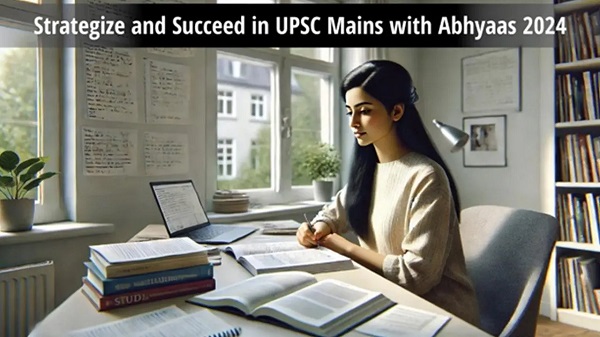Strategize and Succeed in UPSC Mains GS Paper 2 with Abhyaas 2024
As the UPSC Mains fast approach, the key to success lies not just in extensive preparation but in strategic mastery. With only a month left, the pressure to critically analyze and articulate your thoughts especially in General Studies Paper 2 becomes increasingly crucial.
GS Paper 2 covers a wide range of topics, including Polity & Governance, International Relations, and Social Justice. To maximize your score in this paper, it’s essential to focus on high-impact areas and refine your ability to deliver well-structured, persuasive answers.
This blog will guide you through the strategic preparation for GS Paper 2 and demonstrate how Abhyaas Mains 2024 can play a pivotal role in your journey toward UPSC success.
Strategize for High Scores in GS Paper 2
To excel in GS Paper 2, you need to prioritize areas that will have the greatest impact on your score. Each subject within GS Paper 2 requires a unique approach to ensure comprehensive coverage and effective retention. Here’s how to strategically approach each subject:
A) Polity and Governance: Reflecting on the PYQ trends, Polity and Governance has consistently been a major component of GS Paper 2, with a focus on constitutional provisions, amendments, and the functioning of the judiciary and executive. Between 2019 and 2023, a total of 65 questions were asked from this section.
Topics such as federalism, devolution of powers, and judiciary independence have been prominent. Questions often revolve around the role of the executive and judiciary in maintaining the balance of power, with emphasis on landmark judgments and constitutional amendments.
Preparation Strategy:
- Constitutional Provisions and Landmark Judgments: A thorough understanding of the Indian Constitution is the bedrock of Polity & Governance. Focus on key articles, amendments, and landmark judgments that have shaped the legal and political landscape. Regularly update yourself on recommendations from the 2nd ARC, important committee reports, and international best practices.
- Statutory Frameworks and Reports: Familiarize yourself with key statutory acts, committee reports, and authoritative sources. These not only provide substance to your answers but also help in constructing well-grounded arguments. Incorporating relevant statistics and references to authoritative sources will strengthen your points.
- Interlinking Across GS Papers: Connect topics from Polity & Governance with issues in Social Justice and International Relations. For example, the federal structure can be linked to regional disparities, which in turn affect social justice.
B) International Relations (IR): Drawing from the analysis of PYQ’s, International Relations (IR) accounted 20 questions over the period 2019-2023, with recurring themes including India’s bilateral relations with major powers like the USA, Russia, and China, as well as its role in regional and multilateral organizations such as SAARC, ASEAN, and the UN. India’s foreign policy strategies, particularly concerning non-alignment and strategic autonomy, have also been significant.
Preparation Strategy:
- Adopt a Multidimensional Approach: IR demands an understanding of multiple perspectives. Use IR-specific keywords, quotes from diplomats or scholars, and viewpoints to enrich your answers. Utilize maps for locational clarity, especially when discussing regions of strategic interest.
- Data and Treaties: Back up your arguments with data and key treaties. For example, when discussing climate change, refer to the Paris Agreement and India’s commitments under it.
- Stay Updated: Keep track of global events, especially those involving India. Link these events to India’s strategic interests and historical context to present a comprehensive analysis. Understand how global developments impact India’s foreign policy and security concerns.
C) Social Justice: Based on the PYQ trends, Social Justice featured in 15 questions from 2019 to 2023, focusing on government welfare schemes, issues related to poverty, hunger, education, and health policies. The role of NGOs and SHGs in societal development has also been a key theme, alongside the effectiveness of government interventions in reducing social inequalities.
Preparation Strategy:
- Focus on Current Societal Trends: Social Justice is deeply rooted in current societal trends. Connect your understanding of these trends to government policies, welfare schemes, and ongoing social programs. For example, analyzing the impact of the National Food Security Act on reducing hunger.
- Highlight Interlinkages: Demonstrate how issues in Social Justice are interlinked with other section of GS papers, such as Polity & Governance (e.g., the role of constitutional provisions in ensuring social equity) and International Relations (e.g., international conventions on human rights).
- Use Data, Case Studies, and Examples: Incorporate relevant data, case studies, and examples of successful initiatives to add depth to your answers. For instance, use census data to discuss demographic trends or case studies of successful health interventions to illustrate your points.
PYQs and Toppers’ Copy Analysis
A critical step in refining your preparation is analyzing Previous Years’ Questions (PYQs) and reviewing Toppers’ Copies. This process provides valuable insights into exam patterns and effective answer-writing techniques.
- Review PYQs: Analyzing the questions from previous years helps identify recurring themes and important topics that you should prioritize. This ensures that you are focusing on areas with the highest likelihood of being tested.
- Study Toppers’ Copies: Observing how successful candidates structured their answers, incorporated key terms, and presented their arguments provides practical insights into effective answer writing. Adopting these techniques can significantly enhance the quality of your own responses.
Abhyaas Mains 2024: A Crucial Step in Your UPSC Journey
As you refine your knowledge across these critical areas, the ability to translate this knowledge into high-quality answers is what will set you apart. This is where our Abhyaas Mains 2024 – All India Mains (GS + Essay + Optional) Mock Test becomes indispensable.
Driven by our Innovative Assessment System™, developed through extensive research, Abhyaas aligns with the latest UPSC patterns while reflecting the complexity and depth of the actual exam. The system has consistently shown strong coherence between Abhyaas scores and actual UPSC marks, as demonstrated in the 2023 GS Paper 2 results.
Abhyaas Mains 2024 provides a targeted approach to mastering GS Paper 2:
- Simulates the UPSC Mains environment: Build confidence and readiness by practicing under exam-like conditions.
- Focuses on high-priority topics: Ensure deep and relevant preparation that covers the most critical areas.
- Provides personalized feedback: Gain insights into your strengths and areas where improvement is needed.
Scheduled on the 24th, 25th, 31st of August, and 1st of September across 40+ cities, the Abhyaas Mains 2024 program is your pathway to perfecting your preparation and achieving top marks.
In these final days, the emphasis should be on refining your knowledge, honing your answer-writing skills, and practicing under exam-like conditions. With a strategic approach and the support of programs like Abhyaas Mains 2024, you can maximize your potential and approach the UPSC Mains with confidence.
Visit us at: https://visionias.in/abhyaas/login-form.php
Or Call us at: 8468022022, 9019066066


